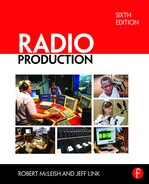The Internet has been a game changer.
These words open Chapter 4 but I repeat them here because of the huge effect that this digital web has had on radio. It has radically affected both its transmission and its reception. It is possible now to do without complex studios and power-hungry transmitters, and the output of music and speech from almost anywhere in the world can be received on a small handheld device, so that refugees fleeing from their Middle-Eastern homeland, out of range of their country’s transmitters, can still keep in touch on a cell phone.
The trend to ever smaller devices, with intuitive functions, providing more and more services, will continue. Consumers want user-friendly gadgets that will slip into their pocket or handbag, capable of delivering touch-screen, voice-activated Internet connections, GPS, SatNav, email, radio and TV. They want to take photos and video, dictate to it to record audio – and provide a visible transcript – and, with reliable coverage, send texts and make phone calls, using a tiny WiFi earpiece. It has to be theft-proof, or if stolen, remotely capable of data destruction.
All this has led to ever more radio channels. As Joseph Kebbie, a broadcaster from Ghana told me, ‘Radio is key. In parts of the world, especially across Africa, radio is still the means whereby most people get their information – more than by television or the Internet which, like a reliable electricity supply, is by no means universal.’ Radio is cheap to run and small stations can be really local, specific not only to the language of the region but to the dialect of the area they serve.
Thus the broadcaster gets ever closer to the listener – something which the use of social media helps to reinforce. One of the themes here is that of making programming more personal – getting alongside your listener, generating companionship, support and loyalty.
Once again, I must acknowledge my debt to so many who have contributed to this book – to the late Frank Gillard for his encouragement with the original draft and for Dave Wilkinson’s ideas for the early illustrations. BBC colleagues were ever helpful in sharing their technical expertise with us – Geoff Woolf, Kevin Johnson, and Iain Meikle, who as our technical reader made many useful observations and amendments. I am grateful for help from programme innovators, Graham Dixon of Radio 3, Chris Harris, David Clayton, and Edd Smith at BBC Radios Solent and Norfolk. Community radio’s Daniele Fisichella at Future Radio, and Kevin Potter at Hope FM Bournemouth, together with the children’s Internet station, Abracadabra Radio, have all contributed. James Lacey of the Cloudbass media company took me over their OB vehicles, my nephew, Craig McLeish, wrote a special arrangement of ‘Down by the Riverside’ for p. 287, and Dr Graham Mytton, the international audience research consultant, very helpfully updated the section on programme evaluation.
We have covered much ground to include our international flavour with pictures and ideas from Roger Stoll of MediAfrique, Jos Verhoogen, Tim Hollingdale and Paul Vernon of Feba Radio, Jane Elliot of the Nova Radio Network in Australia, Kevin Keegan of Trans World Radio, Andrew Steele of the International Communications Training Institute, and Mike Adams of First Response Radio who, with Charles Randall, gave us his experience of the hurricane in the Philippines. I am grateful too for the colourful Paraiso School of Samba, who appear on p. 265, and also Ervin Munir for the use of his specialist music studio.
This edition comes with its own website and there are many who have helped there with images, recording and transcripts. I especially thank Mhairi Campbell for her work here, and also the advertising agencies for the use of their commercials – for the printed text and the audio on the website.
Finally, and above all, I owe a huge debt of gratitude to my co-writer, Jeff Link, whose special skills cover not only all things Internet and social media, but also for his photos and new writing throughout this edition. He has also designed the accompanying website. I am most grateful, and as we look forward to the further expansion of radio usage, we are certain of its development into unexpected areas, with new technologies coming to us in ways yet to be explored.
Robert McLeish
